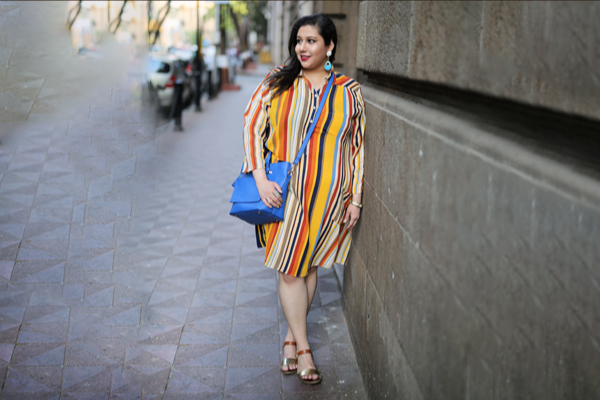Bridging the gap between fashion and the body positive movement, she is defying all stereotypes…
The fashion industry and the body positivity movement may seemingly be two very different thought processes – that are constantly at poetic odds with each other. But here is someone who is working to bridge that gap!
Defying the stereotype that fashion is only a prerogative of the thin and the skinny, plus-size fashion blogger Amena Azeez with her blog Fashionopolis is making a beauty statement that is beyond the confines of just fashion.
Not only has Amena established herself as a blogger in the mainstream fashion industry but also courageously goes against the cultural narrative that forces unrealistic standards of beauty on us. Armed with an impeccable sense of style and undeterred confidence, Amena Azeez is doing justice to the term influencer.
In a candid conversation with Teentalk, Azeez tells us all about the war she is waging against body-shaming and her work to establish body diversity in the Indian fashion circuits…
TeenTalk: As a teenager did your weight ever come in the way of your self-confidence?
AA: For me it started at school. And they carried on to college, but it was not as bad as school. Luckily, my parents never fat shamed me but a lot of extended family members, cousins my own age, did. Because of being fat shamed at a very young age – started for me around 7-8 – I had major self-esteem issues. I had no confidence in myself and I would never try out anything because of the fear of being rejected or turned down because of my body. I tried to make myself as invisible as possible.
Teentalk: Did you face any peer pressure to lose weight and fit in? How did you deal with it?
AA: All the time. I did by caving in. I would take every weight loss advice and put it to use. Once, a friend of mine told me her cousin lost weight by eating only 8 strawberries a day and nothing else. I did the same. Then it was just two apples a day. I also did the whole liquid diet for a while. I tried every popular diet and weight loss technique out there. I was obsessed with losing weight and becoming thin.
Teentalk: When did you learn to stop bothering with what people say and got comfortable with your weight?
AA: When I got introduced to the Body Postive movement. For so many years I had tortured my body in the name of health and weight loss that I realised it was not worth it. In my pursuit to become thin, I did more harm than good. My body has been damaged because of it to a very large extent. After a point it was either carry on and ruin my body more or find a way to make peace with my body and learn to love and accept it at the size and weight I am at.
Teentalk: Any particular instance or episode that has been a defining moment in your perception of body shaming and issues?
AA: I was constantly told that “No man wants a fat wife/girlfriend” and I believed it. So anytime a guy would show interest in me I would wonder why? What does he want? What is the catch? Is this some sort of a “date a fat girl” kinda bet? I could just not believe a man would be interested in me for the person I am. This has lead to a lot of trust issues that I deal with even now.
Teentalk: A word of advice to teens who are growing up in the midst of our patriarchy and face pressure to be a certain way and to fit in?
AA: Your body is your only home. You have one body. Don’t let people ever turn you against your own body. Don’t let people use your body as a way to define you. Most importantly, don’t let people’s words and actions make you hate your body and go to war with it. Trust me, it is not worth it. Fitness is not size specific and you don’t need to harm your body – physically and mentally – to achieve it.
Teentalk: The body shaming campaign is finally here. How would you suggest the teens take part and stand for it?
AA: By speaking up. By letting those who shame you know they do wrong. By being more vocal. By educating yourself better about things like health, fitness and ableism

